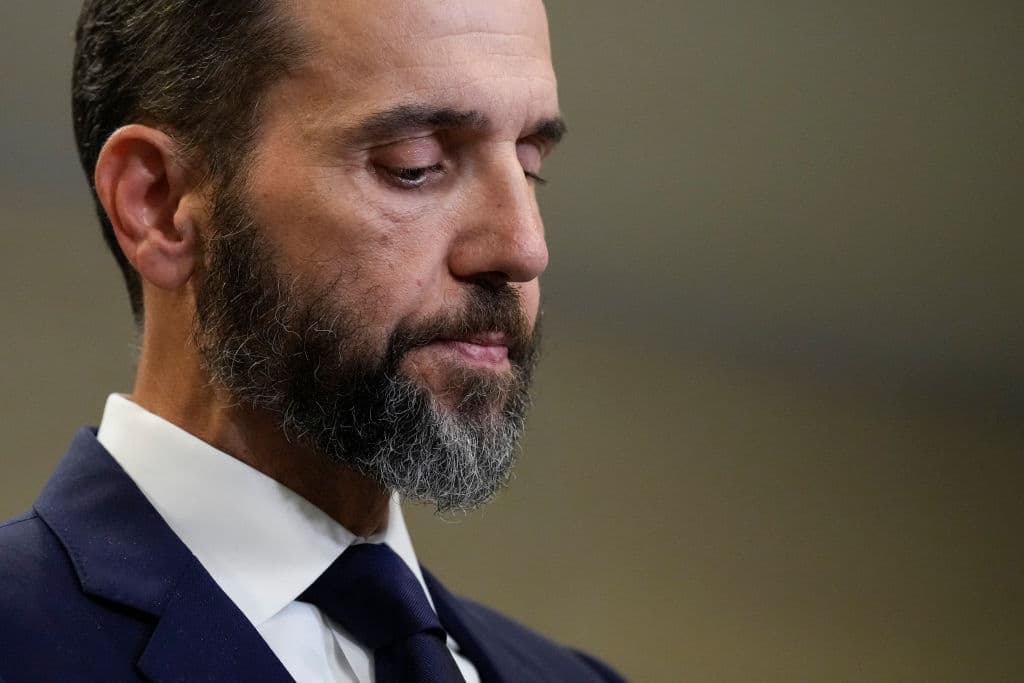June Could Be Jack Smith’s Cruelest Month, as Both of His Trump Cases Are in Danger
The stage is set for June to be a mensis horribilis for the special counsel in South Florida and the District of Columbia.

June is set to be a pivotal — and possibly a cruel — month for Special Counsel Jack Smith’s two cases against President Trump. It appears as if the 45th president enjoys the upper hand in both his January 6 and Mar-a-Lago prosecutions.
Mr. Smith would like to think that the outcome of District Attorney Alvin Bragg’s hush money trial — “guilty” on all counts — is a prelude to his own. Judge Aileen Cannon in South Florida and the Supreme Court, though, both are set to issue rulings this month that could derail the federal cases against the 45th president.
Judge Cannon has already delayed the documents case indefinitely, finding that it presents “novel and difficult questions.” The hearing schedule that accompanied that order, though, is full of potential pitfalls for the special counsel. Between June 21 and June 26, he faces four days of oral arguments that could devastate the case, and possibly result in his banishment from its prosecution.
First, Mr. Smith will be called upon to defend his own appointment as special counsel against a challenge that he was tasked with the job in violation of the Constitution’s Appointments Clause. On Monday, Attorneys General Mukasey and Meese petitioned Judge Cannon for permission to argue the case against Mr. Smith in court.
That sets up the vivid prospect of those two sages facing off against Mr. Smith’s deputies. The case that the special counsel’s appointment is crosswise with the law contends that because he was not nominated by the president and confirmed by the Senate, he lacks the necessary constitutional imprimatur. Mr. Smith was appointed by Attorney General Garland and never confirmed by the Senate.
Mr. Smith, though, argues that he is not a principal officer but a subordinate one, required to report to General Garland and vulnerable to being fired by him as well. This question could ultimately reach the Supreme Court. During oral arguments before that tribunal on the issue of presidential immunity, Justice Clarence Thomas asked Trump’s attorney, John Sauer, “Did you, in this litigation, challenge the appointment of special counsel?”
Mr. Sauer replied, “We have done so in the Southern District of Florida case, and we totally agree with the analysis provided by Attorney General Meese and Attorney General Mukasey.” That suggests that the arguments before Judge Cannon could later be reprised at the Supreme Court. Another justice, Brett Kavanaugh, called the case authorizing independent counsels “one of the Court’s biggest mistakes.”
A ruling from the Supreme Court on whether Trump is entitled to “absolute immunity” for official acts undertaken as president is also expected this month, before the Nine break for the summer. The court, though, could choose to remand the case back to Judge Tanya Chutkan for hearings to determine which of the acts alleged by Mr. Smith in his indictment are private — and therefore fair game for prosecution — and which are public. That could present Mr. Smith with an unhappy choice: He could either scale down his case, or pursue what his office calls its “integrated” current iteration, and be mired in delays far past Election Day.
Judge Cannon’s allotment of three days of oral argument — June 24-26 — to Trump’s “Motions to Compel Discovery and to Define Scope of Prosecution Team” is another ill omen for Mr. Smith. The Supreme Court has held that the obligation of the government, under Brady v. Maryland, to produce evidence applies to any agency or entity involved in the prosecution. Mr. Smith maintains that the roster comprises just his office and some FBI agents.
Trump, though, argues that his federal prosecutions are an all-of-government affair. He wants Judge Cannon to order Mr. Smith to present “exculpatory, discoverable evidence in the hands of the senior officials at the White House, DOJ, and FBI who provided guidance and assistance as this lawless mission proceeded.” The government’s failure to produce evidence that is both material and possibly exculpatory can be grounds for dismissal.
The Department of Justice’s own manual explains that it is the “obligation of federal prosecutors, in preparing for trial, to seek all exculpatory and impeachment information from all the members of the prosecution team.” Trump argues that includes “documents and communications reflecting bias and/or political animus toward President Trump,” including any held by the White House.
The turn of the calendar to July will bring the next chapter in Trump’s hush money case, a story he hopes ends in an appellate acquittal. Judge Juan Merchan will sentence the 45th president on July 11. Trump will then have 30 days to file an appeal at New York’s First Judicial Department appellate court. One of his attorneys, Will Scharf, tells CNN that “we are going to take this as high and far as we need to, including to the United States Supreme Court.”

